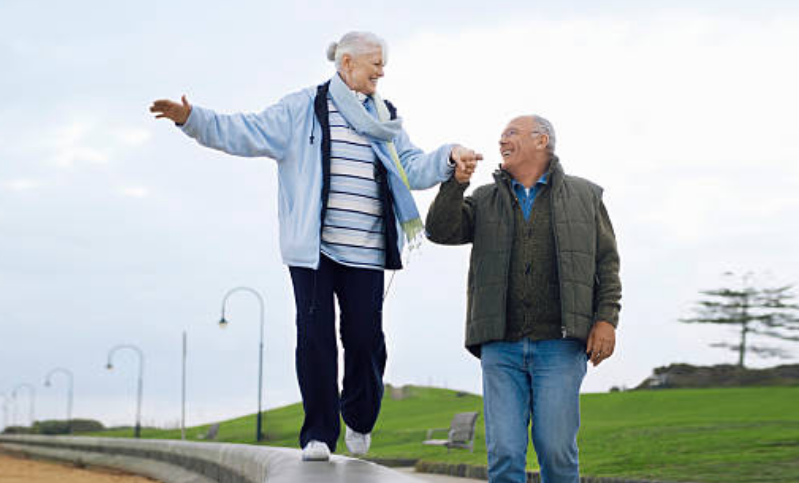Why is balance so important for healthy aging?
Having good balance means being able to control and maintain your body’s position, whether you’re moving or remaining still. For seniors, it’s especially important to help maintain mobility, stay independent, and carry out everyday activities. With good balance, your aging parent is able to walk without staggering, get up from a chair without falling, climb stairs without tripping, and bend over without falling.
Tips for improving balance
Help your loved keep their balance—and their independence—by following some simple advice:
Get off the couch
It’s important for everyone to do some form of exercise on a regular basis. It could be simple indoor movements like practicing going from sitting to standing without using hands or trying to stand on one leg while holding the counter. And, when possible, seniors should take a walk every day, gradually increasing the time they walk and distance they cover.
Be more flexible
Keeping flexible by stretching not only helps us keep our balance as we age, but it will also ease stiff joints and maintain more range of motion. Encourage your loved one to keep limber by doing some basic stretches like side stretching with hands overhead, moving toes up and down, bending at the ankle, or the hamstring stretch with one leg up on a low stool. Or, they can follow a simple yoga routine that can even be done in a chair.
Wet your whistle
Staying hydrated with plenty of fluids throughout the day is important for general health, as well as for balance because being dehydrated can contribute to dizziness. Eight 8-ounce glasses of water per day is a general recommendation, but many factors, such as body size, exercise level, and climate could increase or decrease the amount of water needed. Ask a health care professional what amount is right for your parent.
Pick up a stick
Many seniors avoid using a cane because it makes them feel “old.” But using a cane, walking stick, or other supportive device like a walker, can actually increase independence rather than limit it. Unfortunately, aging adults will gradually lose mobility if they stop walking much or going out for fear of falling. It could be helpful to have a cane available for the “just in case” scenarios and eventually your loved one may become comfortable with the support that a cane or other device offers.
Get “back to school”
Tell your aging parent to take their cue from the students heading back to the classroom this fall and encourage them to sign up for a class. Think Tai Chi, pickleball, chair exercise, chess, or memoir writing. The possibilities are endless and the benefits are many, including strengthening the body and brain for better balance, social interaction, and good old-fashioned fun!
Clear up the clutter
Help your loved one keep their balance around the house by making sure they have clear pathways to move around and that the home is well lit. Eliminate falling or tripping hazards such as clutter on the floor or loose throw rugs. If your parent is unsteady on their feet, install grab bars or railings to help them navigate the house more safely.
Home Care Angels provides assistance with daily activities, such as dressing, eating and personal care, from home service aides. Please call 847.824.5221 to speak with one of our Client Care Coordinators if you would like more information on in-home care.

